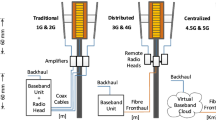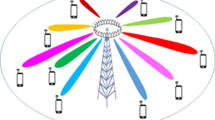Abstract
In the realm of 5G and beyond, the evolution of wireless communication technologies demands efficient solutions to overcome challenges in Massive Multiple-Input Multiple-Output (MIMO) systems for enhanced Mobile Broadband (eMBB) services. The adaptive beamforming technique leverages the spatial domain to enhance the performance of communication systems by forming directional beams toward desired signals while suppressing interference. In a Massive MIMO scenario, where the number of antennas at the base station is significantly increased, adaptive beamforming becomes crucial for mitigating the interference. This paper explores the application of adaptive beamforming using the conventional Least Mean Squares (LMS) and adaptive gradient (Adagrad) algorithm in the context of MIMO for eMBB use cases. It focuses on the design and optimization of beamforming weights in a Massive MIMO setup, considering the challenges posed by interference. Simulations and performance evaluations are conducted to assess the effectiveness of the adaptive beamforming approach in enhancing the array gain and nullifying the interference signal.







Similar content being viewed by others
Data availability
Data is available from the corresponding author [Rajarajeswarie B] upon reasonable request.
References
Balanis CA (2016) Antenna teory: analysis and design, 4th edn. Wiley, Hoboken, New Jersey
Hur S, Kim T, Love DJ, Krogmeier JV, Thomas TA, Ghosh A (2013) Millimeter wave beamforming for wireless backhaul and access in small cell networks. IEEE Trans Commun 61(10):4391–4403
Busari SA, Huq KMS, Mumtaz S, Dai L, Rodriguez J (2018) Millimeter-wave massive mimo communication for future wireless systems: a survey. IEEE Commun Surv Tutor 20(2):836–69
Ganguly S, Ghosh J, Kumar PK (2019) Performance analysis of array signal processing algorithms for adaptive beamforming. URSI Asia-Pacific Radio Sci Conf: 1-6
Konstantinos A, John N (2011) Beamforming in 3G and 4G mobile communications: the switched-beam approach. In: Macas JP (ed) Recent developments in mobile communications—a multidisciplinary approach. InTech
Ali E, Ismail M, Nordin R, Abdulah NF (2017) Beamforming techniques for massive MIMO systems in 5G: overview, classification, and trends for future research. Front Inform Technol Electron Eng 18(6):753–772
Nadeem Q, Kammoun A, Debbah M, Alouini MS (2015) 3D Massive MIMO Systems: modeling and performance analysis. IEEE Trans Wirel Commun 14(12)
Azebaze JPN (2017) Performance analysis of the LMS adaptive algorithm for adaptive beamforming. Int J Appl Eng Res 12(22) (ISSN 0973-4562)
Xiangrong Wang MS, Greco GF (2021) Adaptive sparse array beamformer design by regularized complementary antenna switching. IEEE Trans Signal Process 69:2302–2315
Kadakadiyavar S, Ramrao N, Singh MK (2020) Efficient mixture control chart pattern recognition using adaptive RBF neural network. Int J Inf Tecnol 12:1271–1280
Zhang H, Zeng F (2019) A fibonacci branch search based optimization algorithm for enhanced nulling level control adaptive beamforming technique. IEEE Access 7:160800–160818
Beed RS, Sarkar S, Roy A (2021) Hierarchical Bayesian approach for improving weights for solving multi-objective route optimization problem. Int J Inf Tecnol 13:1331–1341
Wang X, Amin M, Cao X (2018) Analysis and design of optimum sparse array configurations for adaptive beamforming. IEEE Trans Signal Process 66(2):340–351
Mane SV, Bombale UL (2019) Performance analysis of LMS, RLS, CMA algorithms for beamforming in smart antenna systems. Int J Recent Technol Eng 8(4):10515–23
Kamaraju M, Ramakrishna K, Ramanjaneyulu K (2014) A novel adaptive beam forming RLMS algorithm for smart antenna system. Int J Comput Appl 86(5):27–32
Chang DC, Zheng BW (2020) Adaptive generalized sidelobe canceler beamforming with time-varying direction-of-arrival estimation for arrayed sensors. IEEE Sens J 20(8):4403–12
Noh S, Zoltowski MD, Love DJ (2017) Multi-resolution codebook and adaptive beamforming sequence design for millimeter wave beam alignment. IEEE Trans Wirel Commun 16(9):5689–5701
Acknowledgements
This research work is supported by the All India Council for Technical Education (AICTE), New Delhi, India, under RPS-NDF (grant no: 8-3/RIFD/RPS-NDF/Policy-1/2018-2019).
Author information
Authors and Affiliations
Corresponding author
Ethics declarations
Conflict of interest
The authors declare no Conflict of interest.
Rights and permissions
Springer Nature or its licensor (e.g. a society or other partner) holds exclusive rights to this article under a publishing agreement with the author(s) or other rightsholder(s); author self-archiving of the accepted manuscript version of this article is solely governed by the terms of such publishing agreement and applicable law.
About this article
Cite this article
Rajarajeswarie, B., Sandanalakshmi, R. An adaptive beamforming algorithm for millimeter wave MIMO system. Int. j. inf. tecnol. (2024). https://doi.org/10.1007/s41870-024-01824-y
Received:
Accepted:
Published:
DOI: https://doi.org/10.1007/s41870-024-01824-y




